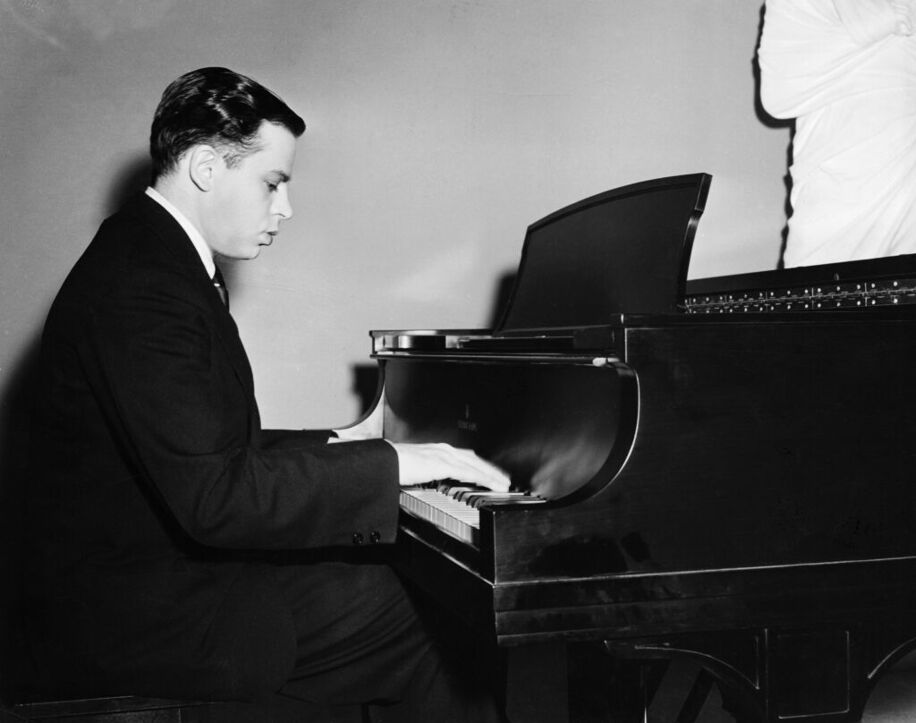Oscar Levant is late.
In Doug Wright’s new play Good Night, Oscar, opening at the Belasco Theater on April 24, there’s suspense from the start, as legendary late-night host Jack Paar (Ben Rappaport) tries to convince NBC President Bob Sarnoff (Peter Grosz) that his guest will, in fact, show up. Eventually. But it’s iffy—even Paar himself doesn’t seem totally convinced. After all, his guest is Oscar Levant, the famous writer, actor, and concert pianist whose irreverent, rapier wit confused and delighted audiences unaccustomed to public figures willing to lambast absolutely everything, including themselves.
That’s just why Sarnoff doesn’t want him on the show. There’s unpredictable good, and unpredictable bad, and a figure known for publically boxing with his own mental health demons might not be what America wanted to see in 1958.
Because that’s where we are. It’s the age of “Mother’s Little Helper” and “Leave It to Beaver,” and even if everybody in America is living in their own private Valley of the Dolls, they’d prefer to keep it that way: private. Not the subject of a famous, primetime meltdown.
Good Night, Oscar covers one night in the life of Levant, a night that never actually existed. The version of the live taping we see is, instead, a composite of some of Levant’s most shocking, and viscerally painful, television appearances from the late 50s and early 60s.
As Jack Paar’s favorite guest—someone about whom the “Tonight Show” host famously said that “for every pearl that comes out of his mouth, a pill goes in”—Levant was a wild card. The pills in question ranged from Demerol to Nembutal to shots of sodium pentothal, the medical establishment’s answer to a host of mental illnesses they didn’t know how to identify or treat properly.
When Levant did show up on TV in the 50s—whether in a rerun of an old MGM musical, a contestant on “What’s My Line,” or the head of his own, short-lived variety hour—you didn’t know what you were going to get. Was he going to make the studio audience explode with laughter by saying—body bent, face screwed up in pain—that he’s a surfer who moved out west for the waves, or make an offhand reference to having downed some stray pills in the dressing room? You didn’t know: that was the glory of it. And in Good Night, Oscar, all Levant’s provocations from a long history of being America’s favorite misfit merge in a moving, viscerally painful collage.
To turn a famously anti-climactic life into drama is no easy task, especially when the life in question is quickly fading from public memory.
Wright, the Pulitzer Prize-winning playwright of I Am My Own Wife and Grey Gardens the musical, first encountered Levant watching TV reruns of musicals like The Band Wagon and An American in Paris as a queer kid growing up in Texas. Years later, while researching George Gershwin for a movie project, he found Levant again. “You can’t really encounter Gershwin,” he tells me, “without encountering Oscar.”
It’s true: Levant’s painful, deeply homoerotic friendship with the “Rhapsody in Blue” composer seems to have equally inspired and tortured him. In 1939, after Gershwin’s early death from a sudden brain tumor, Levant wrote an essay called “My Life, or The Story of George Gershwin” that detailed a life lived in his famous dead friend’s shadow. On stage, Levant takes center stage to recall the first moment—at age 12—that he heard a Gershwin tune, and the uncomfortable rapture that hit him. “I felt the thing any man like me feels in the presence of greatness: envy.”

There’s a strong temptation to call Levant a curiously modern figure: his body of written work stands as one of the most chilling documents of institutionalization for addiction and OCD of the 20th century. A forerunner of mental health confessionalists like Spalding Gray and Hannah Gadsby, Levant appeared on talk shows and radio programs starting in the 1930s with his repeat guest slot on “Information Please,” a kind of pop culture trivia hour. From early on in his career, Levant’s defining characteristics—his encyclopedic knowledge of music, his gigantic store of famous-friend anecdotes ranging from Dorothy Parker to Greta Garbo, his Wildean aphorisms, his textbook OCD symptoms—were already on public display. It wasn’t until Gershwin died that some of his more painful preoccupations came to the fore.
In Good Night, Oscar, all Levant’s provocations from a long history of being America’s favorite misfit merge in a moving, viscerally painful collage.
These are never on fuller display than during Levant’s appearances with Jack Paar, a man who seemed both fascinated by and empathetic toward his friend’s mental health struggles, and eager to cash in on them. Wright’s play mines that relationship—along with the one between Levant and his wife-cum-caretaker June—for the drama that’s always been simmering beneath the surface. “Anyone who’s felt like they’re on the margins,” says Alex Wyse, playing the sweetly eager nepo-hire Max Weinbaum, “can relate to the story of Oscar Levant.”
Good Night, Oscar might, in less caring hands, become something of a greatest hits parade. Here, the details are earned. The time his show got canceled after he made an oral sex joke about Marilyn Monroe? That’s included here. The time he got a four-hour pass from the mental institution to guest on a talk show? That’s the crux of the action. When Gershwin comes on the scene for two brief sequences, the play becomes a fantasia, a rare glimpse into the mind of someone whose paranoias and painful sense of an antagonistic world made him so hard to understand in the context of the American century.

“I’ve written about historical figures a lot in the past,” Wright explains. “And I always try to isolate a moment in their lives when they’ve had to face down a demon or resolve some irresolvable conflict.”
Taking on the towering character of Levant is Sean Hayes, making a return to Broadway. Hayes puts his entire body into the performance, mining Levant’s story for righteous anger and painful laughs. Like Wright, Hayes was drawn to the story of one of the world’s most public and fascinating f*ck-ups. There’s something deeply cathartic about Levant’s story, and it’s no surprise queer people respond to it so much.
“This is the first of my plays where there isn’t an explicitly gay character,” Wright explains. “But because I’m gay, the director of the play [Lisa Peterson] is a lesbian, and Sean Hayes is an out-gay actor, it was impossible not to consider Oscar from that perspective.”
Does he think that the bond between Levant and Gershwin was more than friendly?
“I do think his relationship with Gershwin was somewhat homoerotic. I don’t think they acted on it in any sexual way, but I think it was a profound and enduring love that altered both of them in some pretty formidable ways.”
Perhaps even more than that: for Levant, who had to survive his best friend and assign himself the task of upholding his musical legacy, it was a tragic love.
Related:
Multidisciplinary Artist Migguel Anggelo Explores Gender and Latine Stereotypes in ‘LatinXoxo’
‘LatinXoxo’ is another example of Anggelo’s work existing at the intersection of his queer, Latine, immigrant identity.
Onstage, Hayes shows Levant’s pain exactly as it appears on film: helplessly, on a face that’s scrunched up, almost wincing, as if to be conscious and in public at any point in time is tantamount to torture. And of course, for those of us who deal with mental health struggles, it absolutely is. When Levant tells his wife June (a formidable, fantastic Emily Bergl) that he’s dreaming about being discharged from Mt. Sinai so he can get back to the old, ratty bathrobe he always changes into “around cocktail hour,” it’s one of the more penetrating statements a depressed person is likely to encounter in the modern theater. If you’re depressed, you know that bathrobe well. You’re probably wearing it right now.
But there’s a liveliness to Levant’s pain, too. The man described by S.N. Behrman as “a character who, if he did not exist, could not be imagined” is defined not only by his jittery reliance on pills and coffee, but a contradictory desire to both be in the spotlight and hidden away from it.
We see both sides in Good Night, Oscar, as we follow Levant from his dressing room to a live NBC soundstage, where he gives Paar the show he’s known for. But the reluctance to perform is there, too. A particularly poignant moment has Paar, June Levant, and Bob Sarnoff yelling at Levant to do the thing he’s best known for, the thing that, coincidentally, is the most painful for him to do: play piano. He does, and when he does—with Hayes showing off his early concert pianist training—it can’t help but be moving. We see exactly what he has to go through to get here, to a place of making art.
In Levant’s filmed performances, he cuts a specific figure at the grand piano. The obligatory white shirt and tails never seem to quite fit his body, and his hands, in the process of pounding out some Gershwin masterpiece, become almost clawed, like lobster pincers. He doesn’t just play: he pinches and punches and flattens the piano. Onstage, Hayes plays with admirable feeling, his shadow rising in triplicate, then four-fold, above, a tip of the hat to the famous sequence in “An American in Paris” where Levant, via double exposure, plays every instrument in an orchestral rendering of Gershwin’s “Concerto in F.”
The visual reference is apt: there are always multiple Oscars, and multiple interpretations of Oscar. While the temptation on the part of creators might be to recast him as a tragic clown, an unrequited lover, or a broken figure, Wright’s script and Hayes’ performance —under Lisa Peterson’s deft direction—allow Levant’s painful complexity to manifest onstage.
Early critics of the play have noted that contemporary audiences’ familiarity with a figure like Levant might be on the low end. But it isn’t true. If you’ve ever been so depressed you couldn’t brush your teeth for weeks, or get out of bed on the weekends, or change out of your ratty, disgusting robe, you know Levant. If you’ve ever begged to be understood by a culture that can only see you obstinate rather than sick, you’ll recognize him. Hayes’ performance isn’t a literal one: he doesn’t ape Oscar, he extracts his essence, and that essence is as modern, and as vital as they come, especially in a culture currently reckoning with the pandemic-induced need to take our own mental health more seriously. Discussions of quiet quitting, anti-influencer culture, and depression vlogging belong to the same world Levant did: it’s just become OK to talk about all this stuff out in the open now.
Wright, who grew up with a bipolar father, recognized something of Oscar in his own childhood. “Growing up in that household,” Wright says, “Oscar’s many moods were not foreign to me.”
By talking about the unpleasant things, but by showing himself to the world, twitching and in pain, Levant got us there. With Good Night, Oscar, you can see just how far he’s brought us.
Maybe we’re finally getting closer to becoming a world Oscar Levant could have lived in. ♦
Don't forget to share:
Help make sure LGBTQ+ stories are being told...
We can't rely on mainstream media to tell our stories. That's why we don't lock our articles behind a paywall. Will you support our mission with a contribution today?
Cancel anytime · Proudly LGBTQ+ owned and operated
Read More in Culture
The Latest on INTO
Subscribe to get a twice-weekly dose of queer news, updates, and insights from the INTO team.
in Your Inbox














